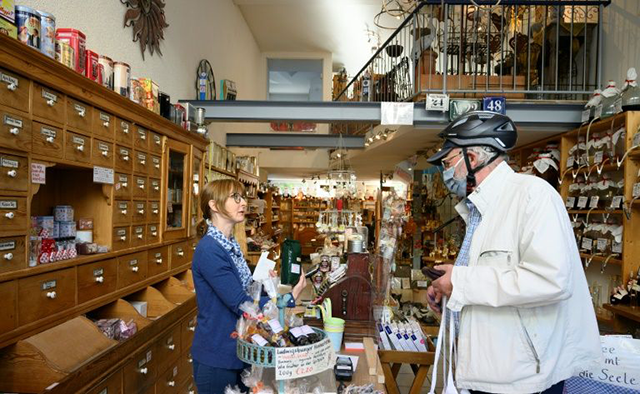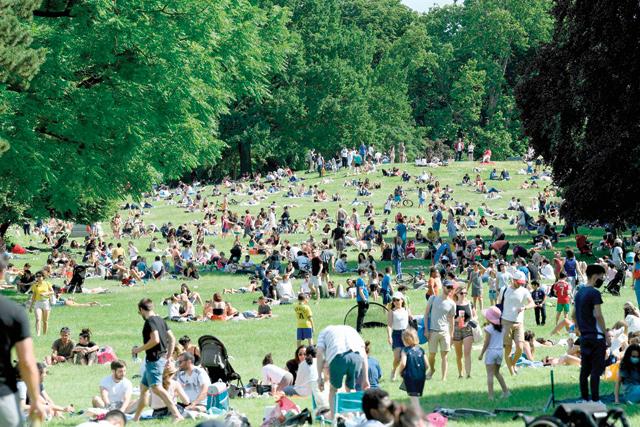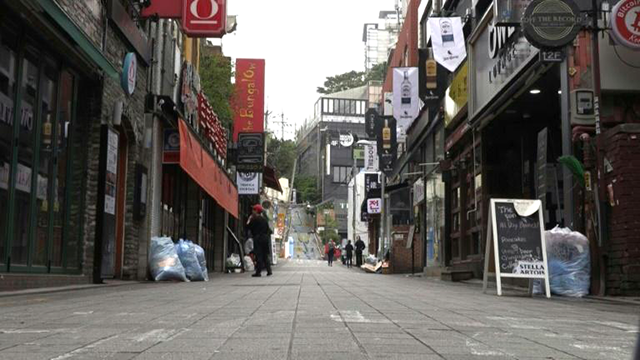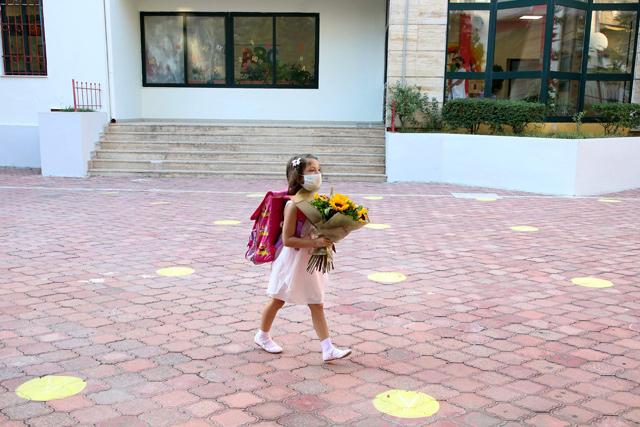You are here
Europe takes cautious steps to ease virus lockdowns
By AFP - Apr 20,2020 - Last updated at Apr 20,2020

Germany has allowed some small shops to open (AFP photo)
PARIS — Germany and other parts of Europe took tentative steps to ease lockdown measures on Monday but officials warned the battle against the coronavirus pandemic was far from over.
Some shops reopened in Germany and Denmark and parents dropped their children off at nurseries in Norway as tight restrictions in place for weeks were lifted in parts of the continent.
But Chancellor Angela Merkel urged Germans to stay disciplined, warning: "We stand at the beginning of the pandemic and are still a long way from being out of the woods."
After being hit hard by the virus that first emerged in China late last year, Europe has seen encouraging signs in recent days, with death rates dropping in Italy, Spain, France and Britain.
The hope is tempered by fears of new waves of infections, warnings that life will not be back to normal for many months and deep concern over the devastating impact the virus is having on the global economy.
But even the smallest return to normality was welcome.
In the German city of Leipzig, fashion store owner Manuela Fischer said she was "incredibly happy" to be welcoming shoppers again.
In Norway, Silje Skifjell dropped off her boys Isaak and Kasper at a nursery in the north of the capital Oslo.
"He was so excited we had to leave the house early to come here and see the other children," she said of four-year-old Isaak, her eldest.
"I almost cried, he was so happy to see his friends."
Governments around the world are mulling how and when to ease lockdowns that have kept more than half of humanity confined to their homes.
The virus has so far infected more than 2.4 million people globally and killed more than 165,000, with nearly two thirds of the victims in Europe, according to an AFP tally.
'Figures give us hope'
Germany, which has been hailed for keeping fatalities low despite a significant number of cases, is allowing smaller shops to reopen in some regions from Monday.
Larger shops and those in major German cities will open later as part of an attempted phased return to a more normal existence that will also see some students go back to school from May 4.
Leipzig resident Abheshek, 25, said he welcomed a requirement to wear masks but was feeling some trepidation.
"I'm afraid when all these people come together the coronavirus will spread a bit more."
Denmark also reopened some small businesses, including hair salons, massage and tattoo parlours, dentists and driving schools, while Italy allowed bookshops to open their doors.
Hard-hit Spain, where a nationwide lockdown has been extended, also said it would ease some restrictions to allow children time outside.
Spain on Monday recorded 399 coronavirus deaths in the last 24 hours, its lowest daily count in weeks, and authorities are starting to shut some makeshift facilities set up to relieve the overburdened health system, including a morgue at a Madrid ice rink.
"Today for the first time we've fallen under 400 deaths... these figures give us hope," said Fernando Simon, the Spanish health ministry's emergencies coordinator.
France, which on Sunday recorded its lowest number of hospital deaths since March 23, also said a nationwide lockdown in force for a month was beginning to bear fruit.
"We are scoring points against the epidemic," French Prime Minister Edouard Philippe said.
But he added: "To imagine that, because the situation has stopped worsening and is starting to improve, the epidemic is behind us, would be a mistake."
In Australia, the authorities in Sydney reopened three beaches for walking, running, swimming or surfing, while New Zealand announced it will ease a nationwide lockdown next week, with Prime Minister Jacinda Ardern saying: "We have stopped a wave of devastation."
And in the United States -- the country with the highest number of deaths and infections -- the governor of hard-hit New York, Andrew Cuomo, said the outbreak was "on the descent".
Anti-lockdown protests
Many governments are anxious to get their countries up and running again, with huge parts of their economies shut down, millions thrown out of work and economists warning of a second Great Depression.
Spain on Monday became the latest country to warn of unprecedented economic hardship, with the central bank the country's economy could contract by a whopping 13.6 percent this year.
In the United States, which has more than 759,000 confirmed infections and nearly 41,000 deaths, some are increasingly chafing under stay-at-home orders and are taking to the streets to protest.
Anti-lockdown demonstrations over the weekend drew hundreds of people in several states, including Colorado, Texas, Maryland, New Hampshire and Ohio.
Many waved American flags, and some carried weapons. But others stayed in their cars or wore protective masks.
President Donald Trump fuelled another bout of fury over the weekend by lending support to the protests against the lockdown restrictions -- which medical experts say save countless lives.
China rejects criticism
China meanwhile hit back at criticism from the United States and several allies over its early handling of the crisis after the virus was first detected in the central city of Wuhan in December.
Trump has suggested that China could have been "knowingly responsible" for spreading the infection, while some in the US government have pushed conspiracy theories claiming the virus could have originated at a maximum-security virology lab in Wuhan.
Calls have been growing for an international investigation into the response by Beijing and the World Health Organisation(WHO). Trump cut US funding to the WHO after accusing it of mismanaging the crisis.
Chinese Foreign Ministry spokesman Geng Shuang said the accusations against Beijing disrespected "the Chinese people's tremendous efforts and sacrifices" in fighting the contagion.
"Any question about China's transparency in the prevention and control of epidemic situation is not in line with facts," Geng said.
Merkel urged Beijing to be as open as possible.
"I believe the more transparent China is about the origin story of the virus, the better it is for everyone in the world in order to learn from it," she told reporters in Berlin.
Related Articles
MOSCOW — Countries across Europe took bolder steps in easing coronavirus lockdowns, with schools, pubs, parks and pools reopening in places,
PARIS — Millions of Europeans were preparing for a return to partial normality on Sunday, a day before officials relax some of world's harsh
COPENHAGEN — Europe will face a rising death toll from the coronavirus during the autumn months, the World Health Organisation (WHO) warned














